高中英语(人教版)必修四Unit1-Women-ofachievement1重点词汇PPT课件
- 格式:ppt
- 大小:1.52 MB
- 文档页数:64
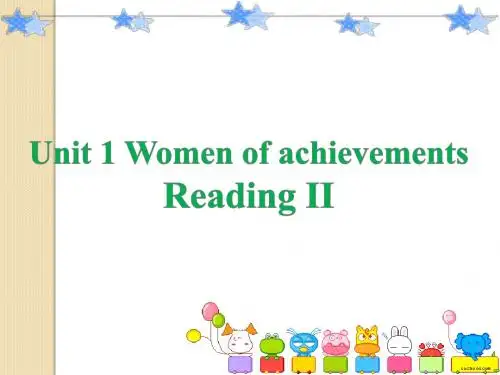

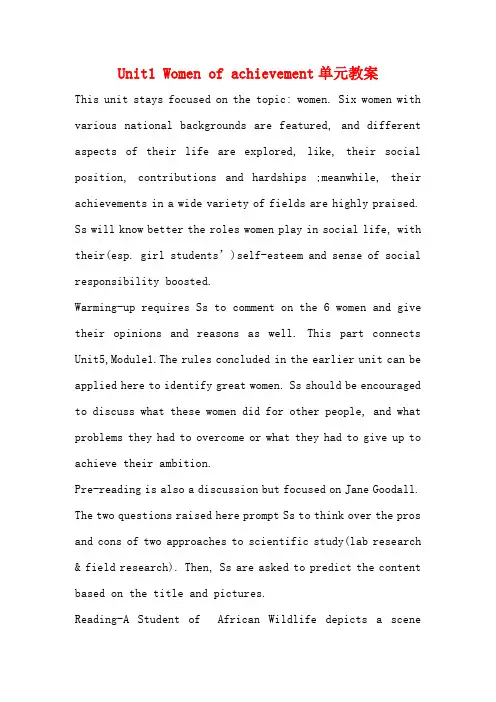
Unit1 Women of achievement单元教案This unit stays focused on the topic: women. Six women with various national backgrounds are featured, and different aspects of their life are explored, like, their social position, contributions and hardships ;meanwhile, their achievements in a wide variety of fields are highly praised. Ss will know better the roles women play in social life, with their(esp. girl students’)self-esteem and sense of social responsibility boosted.Warming-up requires Ss to comment on the 6 women and give their opinions and reasons as well. This part connects Unit5,Module1.The rules concluded in the earlier unit can be applied here to identify great women. Ss should be encouraged to discuss what these women did for other people, and what problems they had to overcome or what they had to give up to achieve their ambition.Pre-reading is also a discussion but focused on Jane Goodall. The two questions raised here prompt Ss to think over the pros and cons of two approaches to scientific study(lab research & field research). Then, Ss are asked to predict the content based on the title and pictures.Reading-A Student of African Wildlife depicts a scenewhere Jane and her colleagues studied chimps in an African forest and explains the significance of their work and the achievements she reached. Despite the fact that it was a dirty and tiring job to do the field research in the wild, they all regarded it as worthwhile. Some of their valuable discoveries would not have been made in the lab;for the very reason Jane Goodall had chosen the primitive African forest to study in.Her years of observing and recording chimps’ daily activities attributed to a better understanding of their behaviour. She has argued that wild animals be left in the wild and not used for entertainment or advertisements. She has endeavored to enhance people’s awareness of understanding, respecting and protecting wild animals. She is an inspiring role model !Comprehending consists of 4 Exx, guiding Ss to comprehend the reading passage at different levels. Exx1-3 are intended to aid Ss to obtain important details ,grasp paragraph main ideas and transfer text information in the form of multiple choice, summing-up and filling in a chart. The 4 open-ended Qs in Ex4 encourage Ss to think in oth ers’ shoes, which helps strengt hen Ss’ faith in animals protection.Learning about Language is to discover and practice usefulwords, expressions and structures. Discovering useful words and expressions is meant to help Ss to further study word formation, key words & phrases; Discovering useful structures centers on “subject-verb agreement”, determining the number of collective noun being the priority for the moment. Form-Meaning-Use approach is encouraged in grammar study.Using language is to train Ss’ in tegrating skills in listening, speaking , reading and writing. Reading features Lin Qiaozhi,a famed specialist in women disease, who achieved great success in her career with remarkable perseverance and efforts. She cared about women and mothers, esp. those living in poverty, and earned respect with her kindness and warn heart. Plus, she dedicated all her life to her patients and Chinese medical care. Ss are expected to learn about an outstanding woman’s life, and, more importantly, get enlightened when considering their future career choice. (Listening, Speaking & writing : omitted)Summing Up,Learning Tip,Reading for Fun: omittedKey points covered in this unit are summarized as follows;⑴ know about great women of achievement in various fields and discuss their qualities;(2) learn how to describe a person with adjectives about people’s qualit ies and personalities;(3) well identify the number of collective noun and master the corresponding principle of keeping verb-form in agreement with the subject;(4) master how to change nouns into verbs, vice versa; Further study word formation;(5) master the following words, expressions and their usage in concrete context:(pls refer to TB4 p.1)_________________________________________________________ ___________________Period One Warming up (p.1); Using language: Listening (p.7)☆ Teaching objectives1. abilitySs will be able to learn about and briefly talk about the 6 women’s life, main deeds and contributions in Warming up; Ss will be able to develop the abilities of pre-listening predicting &listening for key words while listening .2. language knowledge & skillsAfter this period of learning Ss will be able to:Understand the meaning of the following words & phrases and master their basic usage:achievement, welfare project, institute, specialist, connection, human beings, campaign, organization, dress as, help do sth, concern oneself with sth, devote one’s life to sth, found a campaign to do sthLearn how to use the following key sentence patterns: Joan of Arc was a girl from the countryside who dressed as a man and went to fight for the French.She helped drive the English out of France.She helped improve prison conditions and gave prisoners work and education.She concerned herself with welfare projects, especially the China Welfare Institute for women and children.She devoted all her life to medical work for Chinese women and children.Her research showed the connections between chimps and human beings.Jody Williams helped found an international campaign to stop the making of landmines.3. cultural consciousnessSs will be able to know about the unfairness women meet within society and take a right attitude towards gender difference☆ Teaching procedures & waysⅠ:Warming up1. What did Joan of Arc ,Elizabeth Fry, Song Qingling, Lin Qiaozhi, Jane Goodall and Jody Williams do respectively?dress as / fight for / drive sb out of …\\help improve …\\concern oneself with …\\devote one’s life to …\\show the connections between …\\found a campaign to …2. Scan the passages and fill in the tableⅡ :Discussion1. What do these six women have in common?devoted, determined, committed, inspiring, influential, had careers2. Do you still remember Nelson Mandela? What do you think makes a great man or womanⅢ:Listening1. Discuss in groups.Is it easy for women to succeed?What difficulties might women meet? Do you think men have the same problems? Give reasons.2.Listen for the first time and check the ideas that you have just discussed before3. Listen to the tape again and take notes on the three problems given in the listening.-Ex24. Listen once more and fill in the blanks-Ex3Ⅳ: DiscussionIt is said that “it is more difficult for a woman to be succe ssful”. Do you agree or disagree? State your reasons.Ⅴ: Summary and homework1. Remember the following words and expressions.achievement, welfare project, institute, specialist, connection,human beings, campaign, organization, found a campaign dress as / fight for / help drive sb out of some place /help improve / concern oneself with / devote one’s life to /show the connections between …2. Preview the reading “A student of African wildlife”. Study the new words and finish Eexercise 1 on page4 ☆ Reflection:_________________________________________________________________________________________________________________________________________________________________________________________________________________________________________________________________________________________________________________________________________________________________________________________________________________________________________________________________________________________________________________________________________________________________________Period Two Pre-reading (p.1); Reading; Comprehending (pp.2-3)☆ Teaching objectives:1.abilityFurther train Ss to predict the content based on the title and pictures;develo p Ss’ reading skills of grasping the gist, summing up Para. main ideas, obtaining key information, raising Qs (general,detailed,inferring,writing skills) ,and retelling the text with some questions and words as a support; Develop Ss’ ability to acquire inf ormation through reading; summarize the methods of observing chimps and Jane Goodall’s achievements in chimp study and protection.2. language knowledge & skillsAfter this period of learning,Ss will be able to master the following language items in the specific context of the passage-“A Student Of African Wildlife” After this period of learning,Ss will be able to useKey words & phrases:behave, behaviour, shade, worthwhile, nest, bond, observe, childhood, respect, argue, entertainment, inspiremove off, be outspoken about, lead a busy life, crowd in Key structures:Watching a family of chimps wake up is our first activity of the day.Everybody sits and waits in the shade of the trees while the family begins to wake up and move off.Jane warns us that our group is going to be very tired and dirty by the afternoon and she is right.Her work changed the way people think about chimps.3. Affect & attitudeGuide Ss to appreciate the heroine’s spirit of braving hardships.☆ Teaching procedures & ways:I. Pre-reading1. Retell the story about Jane Goodall.study chimps in Africa, show the connections between chimps & human beings, protect chimps2. Discuss in groups.Why do you think Jane Goodall went to Africa to study chimps rather than to university?Do you think she was right? Give your reasons.Can you think of the possible difficulties that Jane Goodall might meet doing her research without training?3. PredictionLook at the title and the pictures. Then answer the following questions.1) What do you think the passage will tell us?2) What is Jane Goodall doing in the picture on the top right?3) What is Jane Goodall doing in the picture on the bottom left?4. Vocabulary matching._____ close connection that people have with each other _____ to fill sb with feelings or aims_____ (of thoughts, questions, etc) to fill one’s mind _____ the period of time when someone is a child_____ giving opinions openly and honestly_____ to move away from a place; to leave_____ task that requires a lot of time and effort_____ to watch carefullyII. Reading1. Fast readingSkim the passage and underline the basic information: what, who, why, where, when, how.2. Underline the topic sentence in each paragraph. Following Jane’s way of studying chimps, our group are all going to visit them in the forest.Nobody before Jane fully understood chimp behaviour.For forty years Jane Goodall has been outspoken about making the rest of the world understand and respect the life of these animals.She has achieved everything she wanted to do.Ssummarize the main idea of each paragraph-Ex2 p.3 Discover the structure of the text.5. Ask questions.Make up questions within your group based on the reading. Each group chooses a best question and the other groups compete to answer it.E.g. what’s the main idea of the first paragraph? (General) When did Jane first arrive in Gombe? (detailed)What do we know about Jane’s personality from the second paragraph? (make an inference)Which part is the summary of the reading? (writing skills)…6. Answer more questions from the T.In which way has Jane helped people? (behave)What did we do before we followed the chimps wandering into the forest? (shade, move off)What did the writer think of the evening? (worthwhile) What did the writer realize after a day’s watching? (bond) How did Jane discover the society of chimps? (observe ) How did Jane try to protect the lives of chimps in their natural habitat? (be outspoken about, respect, argue) When did Jane want to work with animals in their own environment? (childhood)What about Jane’s life now? (lead a busy/meaningful life) Activity III. Post-reading1. In your group rretell the text using the following questions and words as a support.What did the writer do? (behave, shade, worthwhile, bond) What did Jane Goodall do and find out about chimps? (observe, discover)What did Jane Goodall do to protect the chimps? (be outspokenabout, respect, argue)What about her achievements?2. Discuss in groups.Reconsider the title. Do you understand it differently? Discuss with your partners.Do you think it is more important to study chimps in the wild rather than in a zoo? Givereasons.Do you think you would go if you are asked to study animals in the wild? Why or why not?IV. Summary and homeworkRemember the following words and expressions.behave, shade, move off, worthwhile, nest, bond, behaviour, observe, childhood, be outspoken about, respect, argue, entertainment, lead a busy life, crowd in, inspire2. Finish Exercises 1 and 3 ( p. 3) and Exercise 3 (p. 4).☆ Reflection:_________________________________________________________ _________________________________________________________ _________________________________________________________ _________________________________________________________ __________________________________________________________________________________________________________________ _________________________________________________________ _________________________________________________________ _________________________________________________________ ________________________________________Period Three Using language: Reading (p.6), Speaking (p.7)☆ Teaching objectives1. abilityAfter this period of learning,Ss will be able toobtain important information by means of reading and sum up the heroine’s qualities;describe a person’s quality and personality.2.language knowledge & skillsAfter this period of learning,Ss will be able to use the following language items:key words & phrasessickness, intend, emergency, generation, kindness, consideration, deliverdo research on, by chance, come across, cut the death rate, carry onkey sentence patternsBy chance I came across an article about a doctor called LinQiaozhi, a specialist in women’s diseases.Who were the women that Lin Qiaozhi thought needed this advice?Further reading made me realize that it was hard work and determination as well as her gentle nature that got her into medical school.Teaching procedures & waysI. Review1. Review Jane Goodall’s story. Use as many new words from the passage as possible.behave, behaviour, shade, worthwhile, nest, bond, observe, childhood, respect, argue, entertainment, inspiremove off, be outspoken about, lead a busy life, crowd in 2. Check the homework. Share your mother or grandmother’s experiences with your group.Now Let’s look at the career of somebody who lived at the same time as your grandmother.II. Pre-reading1.What do you know about Lin Qiaozhi? (a doctor, a specialist in women’s diseases …)2.Which adjectives could you use to describe her?(devoting, kind, inspiring, respected, clever, …)III. Reading1. Read for the first time. List three of Lin Qiaozhi’s achievements.—Ex 1 p.62. Find the words or phrases in the text to replace the underlined parts.I went to all the bookstores of the town to buy the book, but failed. Today, I found it by chance in my friend’s house. (came across)Last night the heavy rain destroyed the country road and the only doctor in the village had to help a woman to give birth to a baby. (deliver a baby)After my partner left I tried to continue our work as usual. (carry on)The book is designed for children. (is intended for)3. Read again and answer the following questions by using sentences from the passage.When did the writer decide to study at a medical college? (do research on) How did the writer find the article about Lin Qiaozhi? (by chance, come across)For whom and for what purpose did Lin Qiaozhi write a small book about how to look after babies? (cut the death rate, beintended for)Why was it difficult for Lin Qiaozhi to get medical training? (generation, be placed second to)What helped Lin Qiaozhi succeed later on? (kindness and consideration)Why do you think the writer chose to study at medical college? (carry on )IV. Post-reading1.Work in groups to discuss what are the important qualitiesa good doctor should have.Ex2Q4 p.62. What do you think of Lin Qiaozhi? Work in groups to thinkout the adjectives which can describe one’s quality.hard-working energetic active determined intelligentfair generous kindhelpful confident brave honest unselfish devoted educated warm-hearted modest considerate strong-minded self-reliant self-respected responsible3. Group work. Use the adjectives to talk about the great person you admire. Follow the givenoutline.Outline:1) Topic sentence2) Supporting sentences3) ExamplesV. Summary and homework1. Remember the following words and expressions.do research on, by chance, come across, cut the death rate, intend, emergency, generation, kindness, consideration, deliver, carry on2. Write a composition about the person you admire based on your classroom talk.Reflection:_________________________________________________________ _________________________________________________________ _________________________________________________________ _________________________________________________________ _________________________________________________________ _________________________________________________________ _________________________________________________________ _________________________________________________________ ___________________________Period Four Learning about language: Discovering useful words and expressions (p.4); Using words and expressions (p.42)☆ Teaching objectives1. Master the common suffixes transforming verbs into nouns: -ment, -ation, -ion, -ist, -er, -or, -ant, -ee, -ance, -ure2. Study and master the key words & phrases in this unit. Teaching procedures & waysI. Homework checkingShare your writing with our group. Check with each other. II. Word formation1.Fill in the chart with a suitable verb or noun form. Pay attention to the connectionbetween them. (p.4 Ex. 2)2. Work in groups to discuss how verbs can be changed into nouns-ment -ation -ion -ist agree--- move---appreciate--- examine---admit--- educate---tour--- type---3. Can you summarize other suffixes? Give examples if you can. -er -or -ant -ance -ee -urework--- drive--- advise--- act--- conduct--- sail---attend---admit--- attend--- guide---employ--- train---depart --- press--- fail---III. VocabularyWork in groups and study the words and expressions. Try tosummarize the usages. Then make sentences by yourselves.1. achieve sth (success, goal, aim, purpose, etc)1) He achieved his ambition of making a robot.2) Because he was hard-working, he achieved fullmarks in the exam.n. achievement1) The achievement as a teacher is to show his students howto learn.2) A sense of achievement will encourage students to makemore efforts.2.campaign3.dress4. put… to death5.deliver6.behave7.argue8.worthwhile9.observe10.lead a… life11.crowd in12.look down upon13.intend14.carry onIV. PractiseComplete the sentences with the words in their proper forms.1) A sense of_______ (achieve) is very important for a student.2) It is strange that the old lady is_______ (dress) in red.3) His life _________ (devote) to helping the poor.4) It is worthwhile_______(walk) to work every day.5) The school being built is_________(intend) for the homeless children.2. Complete the passage-Ex2 p42V. Summary and homework1. Summarize noun suffixes.2. Finish Exercises 1 and 3 on page 42.☆ Reflection:_________________________________________________________ _________________________________________________________ _________________________________________________________ _________________________________________________________ _________________________________________________________ _________________________________________________________ _________________________________________________________ _______________Period Five Learning about language: Discovering useful structures (p.5);Using structures (p.43)☆ Teaching objectives1. Master the principles of subject-verb agreement when collective nouns,pronuns,nouns or/and pronuns connected by connectors;2. apply the language knowledge about subject-verb agreement to practice.Teaching procedures & waysI. Review-the definition of subject-verb agreementChoose the correct verb form. Can you summarize the rules?I am/are seventeen. // She is/are sixteen.There is/are a desk in the room.· There is/are no chairs in it.John gets/get up at six o’clock every morning.They has/have not come yet.What is/are the latest news about the Olympics?II. Collective nouns1.Study the examples in Ex1 p.5 and2. More examples inEx2 p.53. Guide Ss to summarize the ruleIII. Pronouns1. Look at the following sentences. Note the subjects and verbs2.T’s guidance3. Practise-Ex2 p.43IV. Other examples1.Study the following sentences,payingattention to the subj-v agreement就近一致Practice-Ex3 p.5V. Summary of subject-verb agreement rules :Read through the Grammar summary on pages 88-89.VI. HomeworkFinish Exercise 2 on page 5 and Exercises 1 and 3 on page 43 Reflection_________________________________________________________ _________________________________________________________ _________________________________________________________ _________________________________________________________ _________________________________________________________ _________________________________________________________ _________________________________________________________ _________________________________________________________ ___________________________Period Six Listening and talking (p.41); Listening task (p.44); Reading task (p.44)☆ Teaching objectivesAfter this period of learning, Ss will be able to:1. predict the listening content based on the picture and already-known information ; take notes of key points while listening;2. ⑴adeptly describe a person with adjectives & describe differences between persons;(2)maintain a talk by resorting to communicative strategies, like, asking & clarifying Qs3. while reading,grasp key information & take special note of connecting words.Teaching procedures & waysI. Listening1. Look at the picture on page 41 and read through Exx 2 & 3. What can you predict about the listening?2. listen to Part 1 and finish Ex2 p.413. Listen to Part 2 and finish Ex 3. p.41II. TalkingWhich Chinese woman in the past also disguised herself as a man to join the army?2. Compare Joan of Arc and Mulan3. Read the questions in pairs. You can make up more questions.Why do you admire her?What did she do to impress you most?How would you describe her?Why did she choose to join the army?Was she successful? What happened to her later?Can you give an example to show …?4. Make up a short dialogue in pairsS1: Do you think that Joan of Arc was like Mulan?S2: Well, I suppose she was in some ways. They were both brave, weren’t they?S1: Yes, but I admire Mulan more.S2: What did she do to impress you?S1: …III. Listening Task p441. Before Listening. T: We are going to listen to a dialogue between Ding Lingyu and Ms Jody Williams about the latter’s work to ban landmines.1)What does ICBL mean?2)Why are landmines dangerous? What can landmines do to people?2. Listen to Part 1 carefully and take notes. Fill in the chart in Ex2 p443. Listen to Part 2 and fill in the blanks. Ex3 p44IV. Reading Task p441. What do you know about Elizabeth Fry from Warming-up?A Quaker // Helped improve prison conditions and gave prisoners work and education //Helped the Quakers get the Nobel Peace Prize in 19472. Skim the reading about Elizabeth in five minutes and finish Ex 1. p44V. Homework1. Remember all the new words and phrases in Unit 1.2. Finish Exercise 2 on page 45.3. Think about a special woman you admire and look for some information about her.Reflection:_________________________________________________________ _________________________________________________________ _________________________________________________________ _________________________________________________________ _________________________________________________________ _________________________________________________________ _________________________________________________________ _________________________________________________________ ___________________________Period Seven Using language: Writing (p.7), Summing up (p.7)☆ Teaching objectivesAfter this period of learning, Ss will be able to:1. write about a person’s life and work , using basic writing skills&strategies properly2.sum up what has been covered in Unit 1Teaching procedures & ways.I. Lead inReview the three passages we have read.Think about:what we can write when introducing a person; how we shall organize an article about a person.2. Talk about a great woman you admire.II. Summary1. Possible content:1)personal information2)personality and quality3)things she/he has done4)evaluation from other people2. Possible ways to write the article:Part 1: an introduction of the personPart 2: supporting details1) characters2) achievementsPart 3: a conclusion1) what you think of him/her2) how people view him or her3. Description and evaluation vocabulary4. Writing TipWhen you are writing about somebody’s life, choose an interesting example that shows the person’s character.(p. 8)5. Sayings & proverbs : Reading for fun (p.8)You have to believe in yourself. That’s the secret of success. (Charles Chaplin)人必须相信自己,这就是成功的秘诀。
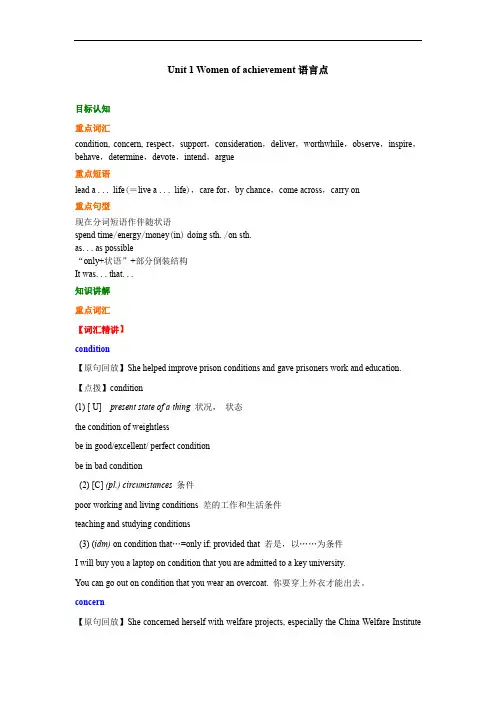
Unit 1 Women of achievement语言点目标认知重点词汇condition, concern, respect,support,consideration,deliver,worthwhile,observe,inspire,behave,determine,devote,intend,argue重点短语lead a ... life(=live a ... life),care for,by chance,come across,carry on重点句型现在分词短语作伴随状语spend time/energy/money(in) doing sth./on sth.as...as possible“only+状语”+部分倒装结构It was...that...知识讲解重点词汇【词汇精讲】condition【原句回放】She helped improve prison conditions and gave prisoners work and education.【点拨】condition(1) [ U] present state of a thing状况,状态the condition of weightlessbe in good/excellent/ perfect conditionbe in bad condition(2) [C] (pl.)circumstances条件poor working and living conditions 差的工作和生活条件teaching and studying conditions(3) (idm) on condition that…=only if; provided that 若是,以……为条件I will buy you a laptop on condition that you are admitted to a key university.You can go out on condition that you wear an overcoat. 你要穿上外衣才能出去。
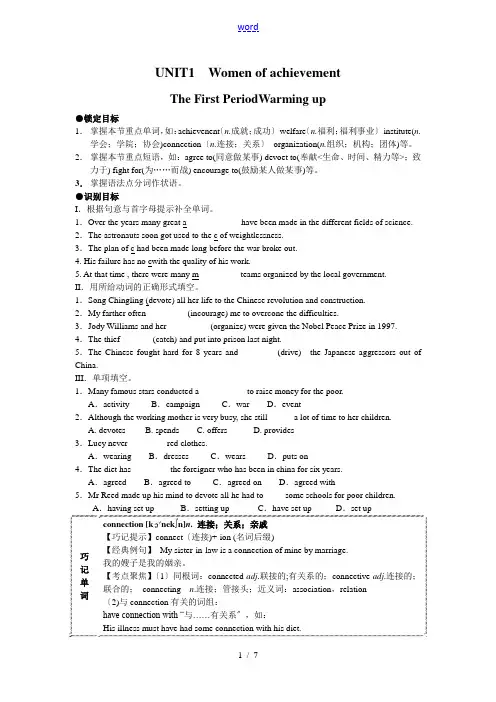
UNIT1 Women of achievementThe First PeriodWarming up●锁定目标1.掌握本节重点单词,如:achievenent〔n.成就;成功〕welfare 〔n.福利;福利事业〕institute(n.学会;学院;协会)connection〔n.连接;关系〕organization(n.组织;机构;团体)等。
2.掌握本节重点短语,如:agree to(同意做某事) devoet to(奉献<生命、时间、精力等>;致力于) fight for(为……而战) encourage to(鼓励某人做某事)等。
3.掌握语法点分词作状语。
●识别目标I.根据句意与首字母提示补全单词。
1.Over the years many great a____________ have been made in the different fields of science. 2.The astronauts soon got used to the c of weightlessness.3.The plan of c had been made long before the war broke out.4. His failure has no cwith the quality of his work.5. At that time , there were many m_________ teams organized by the local government.II .用所给动词的正确形式填空。
1.Song Chingling (devote) all her life to the Chinese revolution and construction.2.My farther often _________(incourage) me to overcone the difficulties.3.Jody Williams and her _________ (organize) were given the Nobel Peace Prize in 1997. 4.The thief _______(catch) and put into prison last night.5.The Chinese fought hard for 8 years and _______(drive) the Japanese aggressors out of China.III .单项填空。
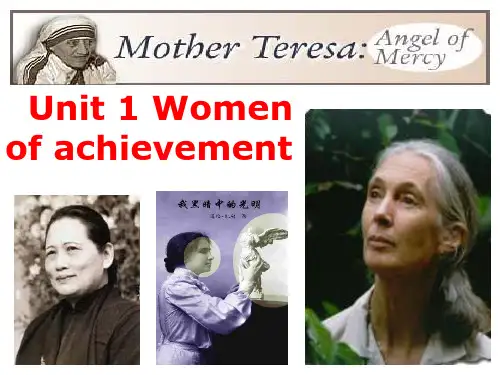
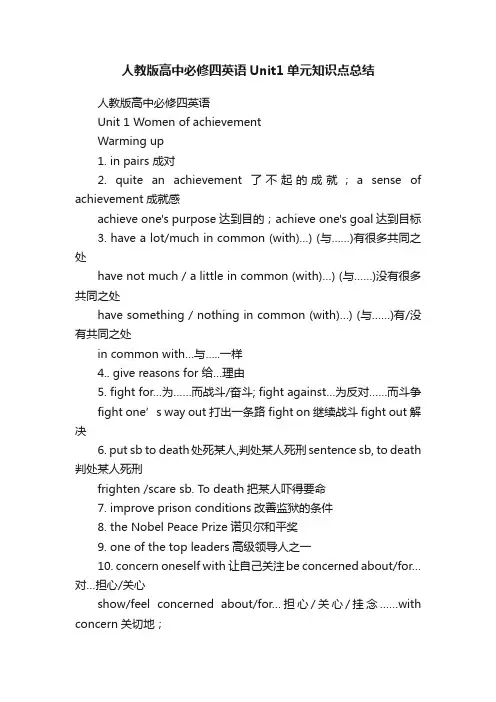
人教版高中必修四英语Unit1单元知识点总结人教版高中必修四英语Unit 1 Women of achievementWarming up1. in pairs 成对2. quite an achievement 了不起的成就;a sense of achievement成就感achieve one's purpose达到目的;achieve one's goal达到目标3. have a lot/much in common (with)…) (与……)有很多共同之处have not much / a little in common (with)…) (与……)没有很多共同之处have something / nothing in common (with)…) (与……)有/没有共同之处in common with…与…..一样4.. give reasons for 给…理由5. fight for…为……而战斗/奋斗; fight ag ainst…为反对……而斗争fight one’s way out打出一条路fight on继续战斗fight out解决6. put sb to death处死某人,判处某人死刑sentence sb, to death 判处某人死刑frighten /scare sb. To death把某人吓得要命7. improve prison conditions改善监狱的条件8. the Nobel Peace Prize诺贝尔和平奖9. one of the top leaders高级领导人之一10. concern oneself with 让自己关注be concerned about/for…对…担心/关心show/feel concerned about/for…担心/关心/挂念……with concern关切地;have no concern for…毫不关心……have no concert with…. 与……无关as far as I am concerned 在我看来11.. welfare projects福利项目12.. China Welfare Institute中国福利协会13. a specialist in women's illnesses妇科疾病的专家14. devote all her life to将自己的一生献给… 致力于…devote sth /oneself to +n./pron./doing 或be devoted to +n./pron./doing奉献……于……15. encourage sb 鼓励某人;encourage sb to do sth.鼓励某人做某事16. show the connection between A and B显示出A和B之间的联系the connection of A with B A与B的关系/联系in connection with…与……相关联;关于……be connected with…与……有关系;与……有亲戚关系“与……有关系”表达法:be related to ; be linked with; be involved in ; be in relation to ; be in connection with17. a campaign for…争取得到……的运动 a campaign against…反对……的运动a campaign to do…为了做……而进行的运动campaign for…参加争取……的运动campaign against…参加反对……的运动18. as…as possible (= as…as one can) 尽可能……“尽力做某事”的表达法有:try to do sth. try/do one’s best to do sth.do all/ everything (that) one can to do sth.; do what one can to do sth.;make every effort to do sth; make efforts to do sth.; spare noeffort to do sth.;go all out to do sth.; do everything in one’s power.19.. rather than而不是Pre-reading, reading and comprehending20. behave like humans像人类的举止behave oneself举止得体;守规矩behave like…表现得像……behave towards…对待……behave well/with good manners表现好/有礼貌behave badly 表现不好21. the night before前一天晚上22. in the shade of…在……的阴影下in the shade 在阴凉处23. move off离开;启程;出发(=start (out)= set out= set off)Move away搬走;move out迁出;搬出去move on继续前进;进行搬迁24.warn sb. of /about sth.警告/提醒某人某事warn sb. against doing sth; 或者warn sb not to do sth. 警告某人不要做某事25. make it all worthwhile觉得这一切都是值得的It is worthwhile to do sth or It is worthwhile doing sth.做某事是值得的be wo rth one’s while doing / to do s th. 值得做某事注意这些句型的差异:worth; worthy; worthwhile1)be worth + n.=be worthy of + n.The matter is worth consideration =The matter is worthy of consideration.这件事值得考虑。
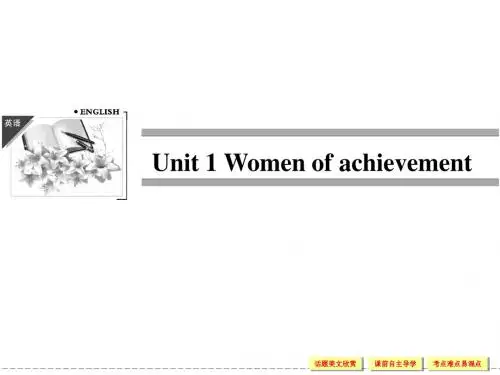

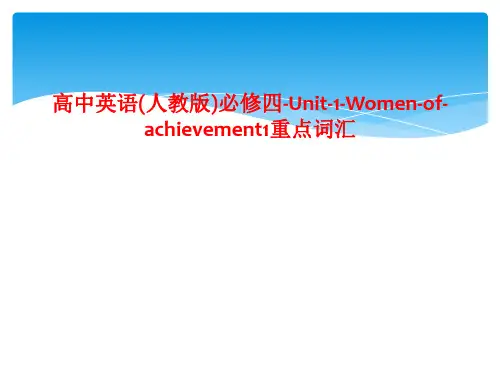
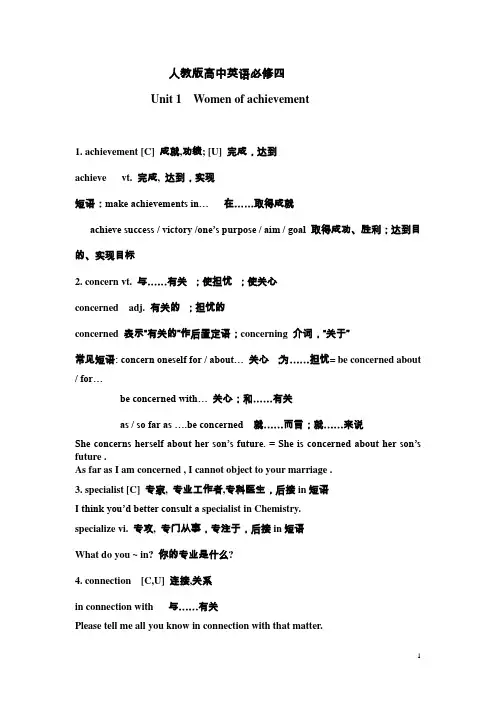
人教版高中英语必修四Unit 1 Women of achievement1. achievement [C] 成就,功绩; [U] 完成,达到achieve vt. 完成, 达到,实现短语:make achievements in… 在……取得成就achieve success / victory /one’s purpose / aim / goal 取得成功、胜利;达到目的、实现目标2. concern vt. 与……有关;使担忧;使关心concerned adj. 有关的;担忧的concerned 表示“有关的”作后置定语;concerning 介词,“关于”常见短语: concern oneself for / about… 关心;为……担忧= be concerned about / for…be concerned with… 关心;和……有关as / so far as ….be concerned 就……而言;就……来说She concerns herself about her son’s future. = She is concerned about her son’s future .As far as I am concerned , I cannot object to your marriage .3. specialist [C] 专家, 专业工作者,专科医生,后接in短语I think you’d better consult a specialist in Chemistry.specialize vi. 专攻, 专门从事,专注于,后接in短语What do you ~ in? 你的专业是什么?4. connection [C,U] 连接,关系in connection with 与……有关Please tell me all you know in connection with that matter.请把你知道的关于那件事的所有的情况告诉我。
Unit1 Women Of Achievement(一)核心词汇1.behave vt&vi举动;(举止或行为)表现1)behave well /badly towards sb 对待某人好/差They behaved badly towards guests,which made us very disappointed .他们对客人态度很差,这使我们很失望。
2)behave oneself 守规矩;表现得体Behave yourself ! 规矩点!3)well-behaved adj表现好的badly-behaved adj表现差的well-behaved/badly-behaved little boys行为规矩的/不规矩的小男孩们4)behavior n 举止;行为mind one’s behavior注意某人的举止We each should mind our behavior in public places.在公共场合我们每一个人都应该注意自己的行为举止。
2.worthwhile adj 值得的;值得做的1)It is worthwhile doing /to do sth做某事是值得的It is worthwhile to visit /visiting the Great Wall .= Visiting the Great Wall is worthwhile。
参观长城是值得的。
2)It is worth one’s while to do /doing sth值得某人做某事It is worth your while to visit /visiting the Great Wall .你参观长城是值得的。
3)be well worth doingThe Great Wall is well worth visiting .长城值得参观。
4)be worthy of +n/being dongbe worthy to be doneThe Great Wall is worthy of a visit .=The Great Wall is worthy of being visited .=The Great Wall is worthy to be visited.长城值得参观。
人教版高中英语必修四Unit 1课文翻译Unit 1 Women of achievement―Reading―A STUDENT OF AFRICAN WILDLIFE非洲野生动物研究者It is 5:45 am and the sun is just rising over Gombe National Park in East Africa. 清晨5点45分,太阳刚从东非的贡贝国家公园的上空升起,Following Jane's way of studying chimps, our group are all going to visit them in the forest. 我们一行人准备按照简研究黑猩猩的方法去森林里拜访它们。
Jane has studied these families of chimps for many years and helped people understand how much they behave like humans. 简研究这些黑猩猩家族已经很多年了,她帮助人们了解黑猩猩跟人类的行为是多么的相似。
Watching a family of chimps wake up is our first activity of the day. 我们当天的首项任务就是观察黑猩猩一家是如何醒来的。
This means going back to the place where we left the family sleeping in a tree the night before. 这意味着我们要返回前一天晚上我们离开黑猩猩一家睡觉的大树旁。
Everybody sits and waits in the shade of the trees while the family begins to wake up and move off. 大家坐在树荫下等待着,这时候猩猩们睡醒了,准备离开。
人教版高中必修四英语Unit 1 Women of achievement 教案【教学内容】人教版新课标高中英语必修4 第一单元(Unit 1 Women of achievement) 第一课时阅读课 A SUDENT OF AFRICAN WILDLIFE【教材分析】本单元紧扣“女性”这一中心话题,通过介绍几位生活在不同国度的杰出女性,探讨女性在社会生活中的地位、价值和贡献,关注她们所面临的困难,讴歌她们在社会各个领域的成就。
学习本单元内容有助于提高学生对妇女的社会角色的认识,培养学生(尤其是女学生)的自信心、事业心和社会责任感,建立正确的性别观和社会观。
“热身”(Warming Up)部分要求学生评论课本列出的六位女性,就她们是否称得上是“伟人”提出自己的观点和理由。
该部分呼应了模块一中第五单元Nelson Mandela-a modern hero的“热身”部分。
在学习这一单元时,学生们经过讨论已总结出区分名人与伟人的标准。
因此,在教学本单元时,教师可以让学生沿用这一标准,并针对本单元具体内容进行讨论,当然,学生也可以提出自己的看法。
教师应当鼓励学生提出异议,但必须注意以下两点:(1)学生所提出的观点要有积极意义;(2)学生应有理有据地阐述自己的观点并使其令人信服。
“读前”(Pre-reading)部分提出了两个问题:Jane Goodall 为什么不在大学里进行专业的生物学研究而要到非洲去研究黑猩猩?她的工作有什么重要意义?这两个问题不仅要求学生思考她的工作对人类的影响,还要求学生思考两种不同的研究方法(即实验室研究法与野外研究法)的优势与不足之处。
“阅读”(Reading)部分以《非洲野生动物保护者》为题,描写了Jane与她的同事们在非洲原始森林观察非洲黑猩猩的一个片段,并阐释她从事这项工作的重要性以及她所取得的成就。
尽管他们在野外的考察工作又脏又累,但他们觉得这样做是值得的,他们有一些重要的发现是在学校的实验室不可能获得的,这正是Jane Goodall要到非洲原始森林来的原因。